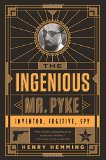Summary | Excerpt | Reviews | Beyond the Book | Readalikes | Genres & Themes | Author Bio

Inventor, Fugitive, Spy
by Henry Hemming
Or was it?
Pyke knew that once he was in Germany he could pass his reports to Edward Lyell Fox, a twenty-six-year-old Special Correspondent from America who claimed he was able to smuggle uncensored material into and out of Germany. All Pyke had to do was get in and out again himself. While he did not, as yet, know how to do this, he assured the News Editor at the Daily Chronicle, Ernest Perris, that there was a plan but it had to remain secret. Pyke did not intend to get bogged down in details. He wanted to jump.
In outline, at least, it was an impressive proposition. The thought of an English war correspondent in Berlin bristled with the kind of paradoxical ingenuity which Pyke so admired in others. He liked the challenge of it. 'Glory of glory at having something to do that seemed impossible,' he wrote, 'something necessitating all the virtues and all the vices imaginable, something for which one would have to be alert and cautious, receptive and sceptical, something that would necessitate twenty-four hours' work and twenty-five hours' watchful- ness a day, and above all things the colossal humour of the idea.' But it was hard to see how he could actually spirit himself into the country, let alone out again.
For a moment Pyke's idea hung in the air between him and Perris, there to be embraced as a stroke of brilliance or swatted aside as an adolescent daydream. As far as we know, Pyke had given a good account of himself. Having gone up to Cambridge as 'an excessively shy youth' he had rapidly grown into himself, speaking regularly in union debates before moving on to the heretics. While he might have had the occasional off-day during his first year at the union, his speeches became funnier with practice and more fluent. The Cambridge Review noted Pyke's 'fine voice', describing him as 'a good elocutionist'; the Cambridge Magazine compared his delivery to 'a soft and pleasing song'; while for Granta, '[Pyke] probably does some thinking in his spare moments.'
Ernest Perris spoke for the next half-hour, pacing the room, dropping occasionally into his swivel chair and swinging a leg over the arm. He liked the plan, yes, he was intrigued by it, he got the humour of it. Perris enjoyed the idea of having a Chronicle correspondent in Germany, in the way that he liked the thought of setting up a practical joke, but it was hard to say whether the young man sitting in front of him would be able to pull it off.
Perris later described his visitor on that day as 'a rather brilliant but erratic youth of twenty-one' (Pyke was twenty), who had, Perris understood, done 'brilliantly at Cambridge, but has always been ill-balanced'. Pyke had in fact scraped through his only Cambridge examination nine months earlier with a Third. While in a time of peace this apparent imbalance might have counted against him, by September 1914 the journalistic landscape had changed. The first scoop of the war had come to the Daily Telegraph from an unknown American freelancer after he had overheard the doorman at the US Embassy confirm the German advance into Belgium. Just as Perris needed a scoop, he appreciated that it might come from an unusual source. His main hesitation concerned the idea of sending an inexperienced correspondent into enemy territory on what might later be described as a fool's errand.
Perris offered Pyke the following terms: Perris would publish any material that Pyke could get out of Germany and would pay the standard rate offered to Special Correspondents, but he could not offer Pyke a position on the Chronicle's staff. Nor would the paper be legally responsible for him. It would, however, make a contribution to his expenses.
Pyke accepted.
'Righto!' concluded Perris. 'Let's leave it at that.'
Excerpted from The Ingenious Mr. Pyke: Inventor, Fugitive, Spy by Henry Hemming. Copyright © 2015 by Henry Hemming. Reprinted with permission from PublicAffairs.
A classic is a book that has never finished saying what it has to say
Click Here to find out who said this, as well as discovering other famous literary quotes!
Your guide toexceptional books
BookBrowse seeks out and recommends the best in contemporary fiction and nonfiction—books that not only engage and entertain but also deepen our understanding of ourselves and the world around us.